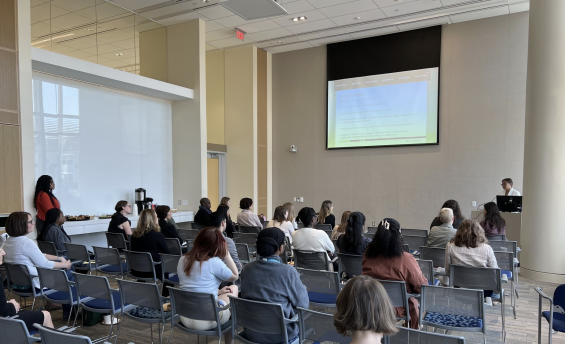Morning Speaker Series Expert Q&A: Dr. Florence Momplaisir
Editor’s Note: Each week, PolicyLab hosts our “Morning Speaker Series,” featuring experts who present their research and ongoing projects on a variety of topics including public health, policy, research methods, health equity, and population health, providing us with an opportunity to learn from our colleagues and partners. Now, we’re offering our blog readers a glimpse into these sessions through a blog post series in which we interview some of our speakers about their exciting work. This is the first post in the series.
Dr. Momplaisir led PolicyLab’s inaugural Minority Health Month Annual Lecture—which recognizes the impactful work of an individual promoting equity and inclusion within research and/or the community—as part of our Morning Speaker Series. Following her presentation on her research to improve postpartum retention in care and viral suppression of pregnant and postpartum women living with HIV, we sat down with Dr. Momplaisir to ask her a few brief questions about her work:
What racial/ethnic disparities in HIV prevalence for women & girls do you and your team work to address?
Despite significant progress in the reduction of perinatal transmission of HIV, there has been less attention given to cisgender women with HIV, particularly on assessing women’s health outcomes in the postpartum period. Our work tries to address this gap and tackles race-based disparities by testing interventions aimed at improving postpartum retention in care and viral suppression of Black and Hispanic women, as they are disproportionately affected by the HIV epidemic. We also focus on improving outcomes of postpartum women in the South as they have less access to care, initiate treatment later and have worse survival than women in other U.S. regions.
What is one way we can improve care for pregnant & postpartum women with HIV?
Given the high prevalence of psychosocial stressors in the postpartum period, we think that an effective approach to improving the care of pregnant and postpartum women with HIV is to develop an operational support system to leverage retention in care postpartum. We are currently testing a peer-led behavioral intervention to provide social support during face-to-face sessions and weekly texts, provide HIV education, and reduce barriers associated with adherence to antiretroviral therapy and retention in care. This work is being done across U.S. cities in the Northeast and the South.
What Additional Research is Needed in this Space?
In our work, we found that a significant number of women with HIV entering pregnancy had unplanned pregnancy, and about 25% of them had a prenatal diagnosis of HIV. The intersectionality of unplanned pregnancy, a new HIV diagnosis—superimposed with social determinants—may contribute to worsening depressive symptoms. Mental health remains an unaddressed need for many women with HIV, and more efforts are needed to build capacity to deliver mental health treatment and services. This is important because women with perinatal depressive symptoms are less likely to adhere to HIV therapy.
What is one key policy implication for this body of work?
Our work has many policy implications, but I think it’s most important to focus on:
- addressing the root causes of racial and ethnic inequity in HIV incidence and HIV-related outcomes,
- improving access to prenatal care and preventative women’s health, and
- implementing models of care where HIV, mental health, and women’s health care needs can be addressed in an integrated way.


